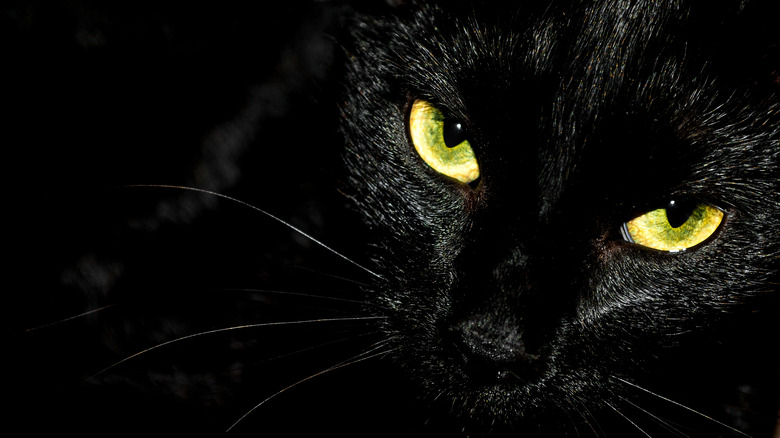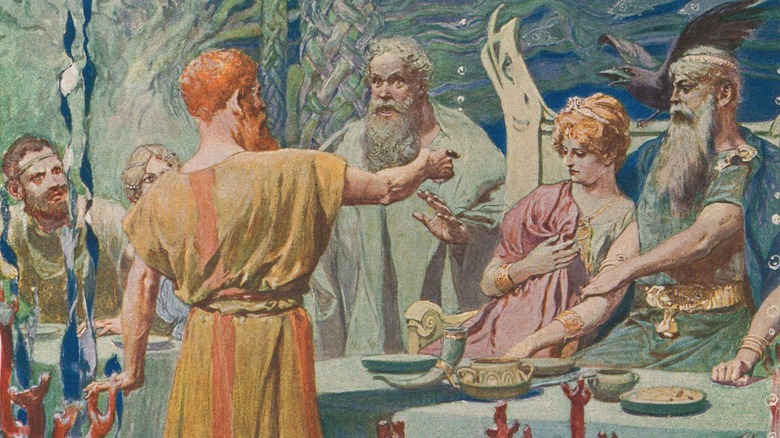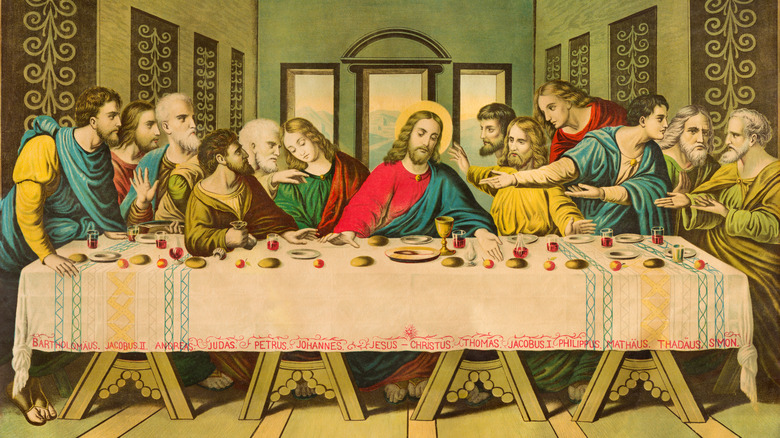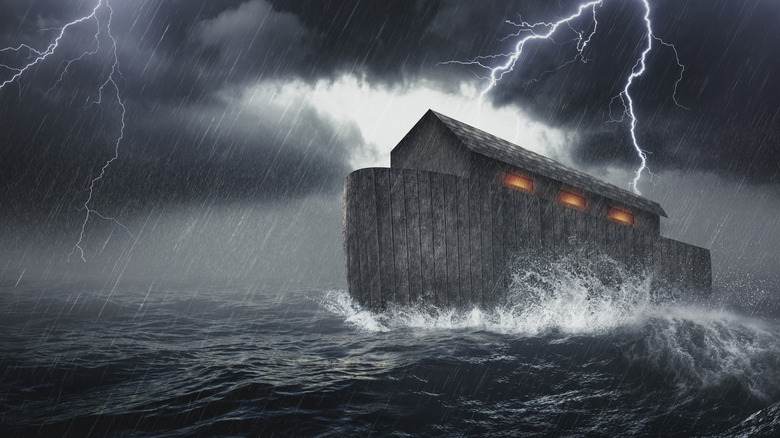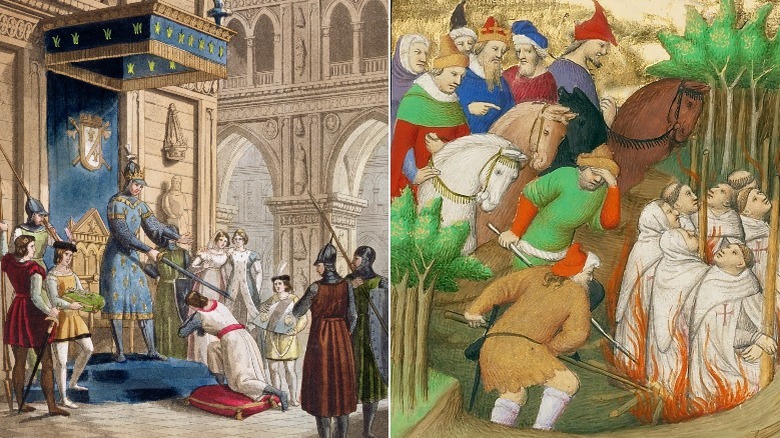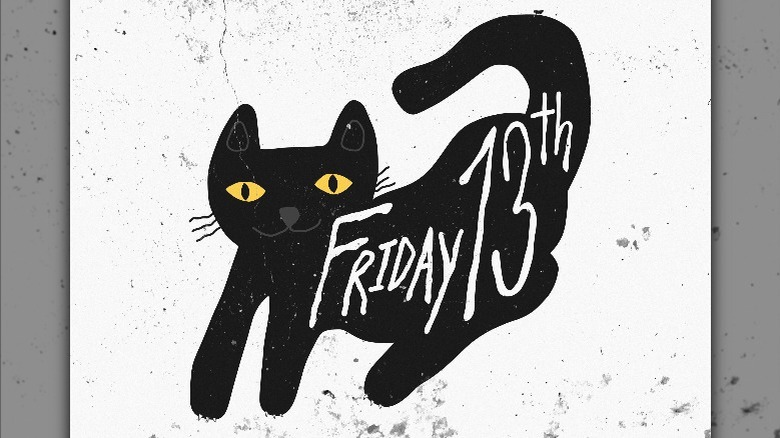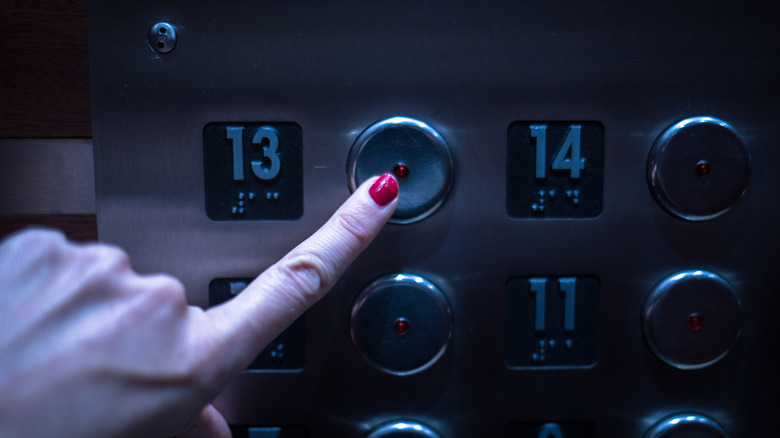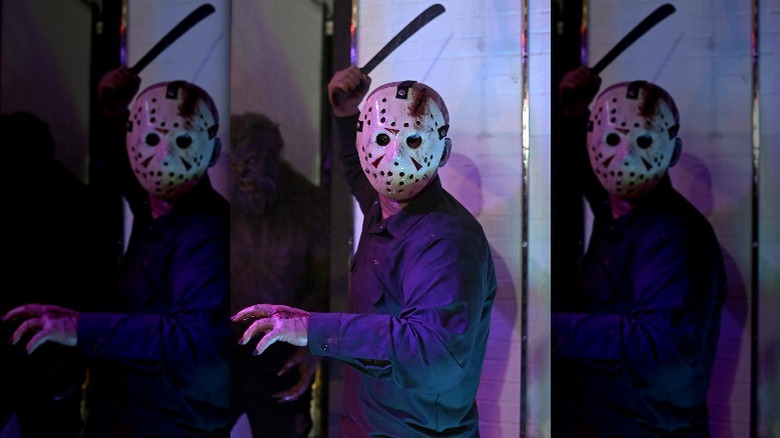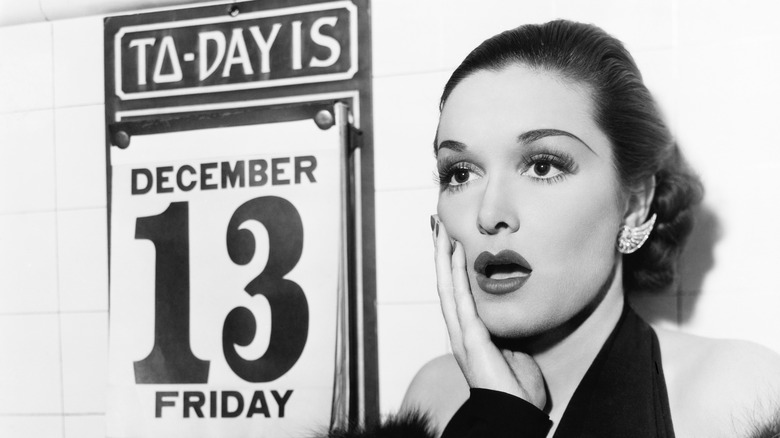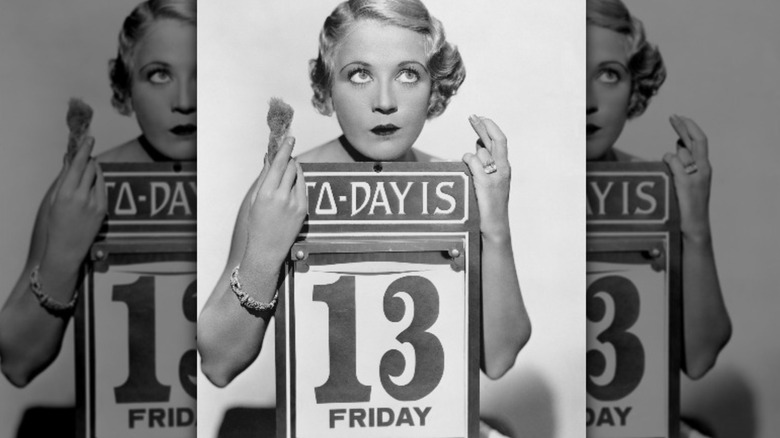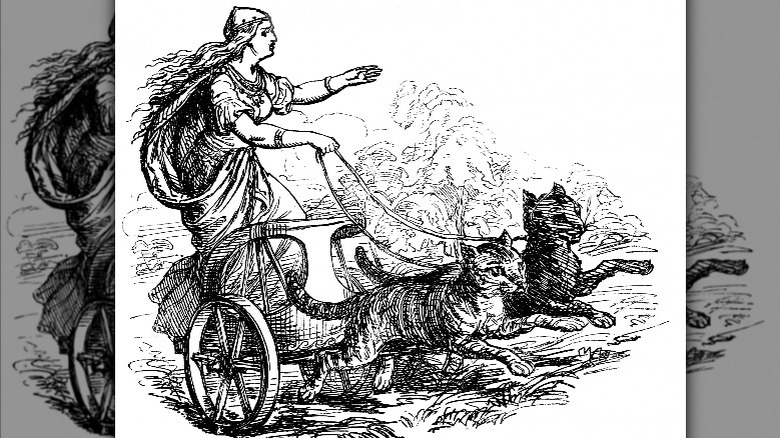What You Never Knew About Friday The 13th
Depending on your perspective, Friday the 13th is a date that can seem somewhat spooky or nothing more than silly superstition. Though nowadays, the seemingly unlucky day has cemented itself into pop culture and the hearts of horror fans with creepy slashers like the "Friday the 13th" franchise, the actual origins of the date have existed long before Jason Voorhees put on his iconic hockey mask. So naturally, Friday the 13th's murderous stab into entertainment's horror genre doesn't really tell the whole story.
While it's historically Western culture that typically associates both Friday the 13th and the number 13 with bad luck, the day also has ties to Norse mythology as well as Christianity. So, with the traditions and beliefs stemming from both date and day, it perhaps comes as no surprise that even in modern times, there are still those who are a bit skeptical that there's nothing to fear about Friday the 13th. Still, with plenty of questionable superstitions surrounding the date, fans of all things spooky and those who are simply curious might be dying to know more of the facts about the seemingly ominous Friday the 13th.
According to experts, Friday the 13th can only occur so many times in a year
The number 13 is often considered unlucky, depending on who you ask. However, according to National Geographic, those who fear the supposed doom of Friday the 13th will never have to deal with the day more than three times a year. Mathematician, professor, and author Underwood Dudley says the chances of more than three Friday the 13ths in one year isn't just unlikely; it's physically impossible. "You can't have any [years] with none, and you can't have any with four, because of our funny calendar," he states.
Dudley is, of course, referring to the Gregorian calendar, which has been used to mark the passage of time since 1582 when Pope Gregory XIII demanded that the Catholic Church use it over the previously followed Julian calendar. While the Gregorian one has similarities to its predecessor, it differs in the fact that it "skips leap year on century years except those divisible by 400."
For those less inclined to do the math, this means that our current calendar system syncs with seasonal changes. In relation, Dudley says that the order in which our days and dates appear actually repeats every 400 years. This also causes a seemingly strange occurrence which makes it more likely than not for the 13th to appear on a Friday. But, don't get too creeped out; the professor tells the educational outlet that this is nothing more than "a funny coincidence."
Friday the 13th has direct ties to Norse mythology
While Friday the 13th is more commonly known to have connections to Christianity, the date's origins actually go back even further. While speaking with National Geographic, folklore historian and author Donald Dossey explained Friday the 13th's origins in Norse mythology. Supposedly, fear of the date can be traced to a Norse myth that speaks of 12 gods at a dinner party in Valhalla (aka the Viking version of heaven). According to the story, things took a turn for the worse when Loki, the god of mischief, crashed the party uninvited and seemingly became the 13th guest.
Once there, Loki made good on his title and stirred up plenty of trouble, leading Hoder, the blind god of darkness, to fatally shoot the god of joy and gladness, Balder the Beautiful, with a mistletoe-tipped arrow. "Balder died, and the whole Earth got dark. The whole Earth mourned. It was a bad, unlucky day," says Dossey. Similarly, a CNN article discussing Friday the 13th superstitions describes how the Norse tale of the party-crashing Loki was spread from Scandinavia to the rest of Europe. By the time Christian faith was beginning to take root, the myth was well known to many.
Some Christians connect Friday the 13th to the Last Supper
As mentioned above, Friday the 13th has its roots in Norse myth. However, fear of the date is also known to have connections to Christianity. As noted by CNN, one famous superstition associated with the bad luck connected to Friday the 13th comes from the story of the Last Supper. So how does the date connect to the infamous tale? According to the gospel, Jesus Christ and his disciples attended the Last Supper on Holy Thursday. Judas Iscariot, the man known for betraying Christ and leading to his crucifixion, was the 13th guest to arrive at the meal. Of course, the actions of Judas served to further the ominous sense around the number 13.
Similarly, in addition to being the day that Christ was crucified, Friday was already considered unlucky. According to the BBC, in Britain, Friday was long thought to be the "unluckiest day of the week." Notably, Geoffrey Chaucer's famous 14th Century work "Canterbury Tales," states, "and on a Friday fell all this mischance." Furthermore, during this time, Friday was also referred to as Hangman's Day since it was the day of the week when the sentences of the condemned were typically carried out. In connecting the two, professor of psychology Stuart Vyse tells National Geographic that the association of unlucky Fridays in combination with Christ's fate created "this sort of double whammy of 13 falling on an already nervous day," says Vyse.
Historically, religion has connected both Friday and the number 13 with ill fate
While the Last Supper clearly added to the tension surrounding Friday the 13th, the idea of unlucky Friday isn't actually anything new in biblical terms. According to CNN, Friday is allegedly the day that Adam and Eve were said to eat the forbidden fruit from the Tree of Knowledge. It's also the day that Cain was said to have murdered his brother Abel, the day King Solomon's Temple was destroyed, and the day Noah's ark set sail during the Great Flood.
Similarly, associate professor of anthropology Phillips Stevens, Jr. told National Geographic that Christianity was definitely a source that circulated fear of the number 13, even passing on the anxiety to those outside of the Christian faith. "It became extremely widespread through the Euro-American world, embedded in culture, [and] extremely persistent," Stevens stated. Clearly, religion has impacted how people view both the day and the number. It's even noted that as far back as ancient Rome, it was believed that witches would meet up in groups of 12, with the devil serving as the 13th guest joining them.
Friday the 13th has ties to the Knights of Templar
It seems that Friday the 13th's origins come from various sources, so it should come as no surprise that one of the date's many popular origin theories goes back to the medieval religious order known as the Knights of Templar. History tells us that the infamous group of warriors was founded sometime around 1118 as a "military order devoted to the protection of pilgrims traveling to the Holy Land following the Christian capture of Jerusalem during the First Crusade." The article adds that the group's fast-growing wealth ultimately led to its demise. Accordingly, it was Friday the 13th in October of 1307 that marked the beginning of the end for the Knights of Templar, leading to arrests, torture, and even death for some of these medieval fighters.
However, National Geographic's dive into the Knights of Templar offers a different take on the group's connection to Friday the 13th. While the article doesn't argue with the date said to have been the start of the medieval warriors' demise, it states that the Knights of Templar's fate isn't connected to the origins of Friday the 13th as a day of bad luck. Instead, the piece claims that the date's association with misfortune started in 1907, with Thomas W. Lawson's book "Friday, the Thirteenth." Similarly, author Nathaniel Lachenmeyer's work argues that while Friday and the number 13 had negative associations, they weren't combined into a spooky day until the 20th century.
The Thirteen Club scoffed at superstitions like Friday the 13th
While plenty of individuals became superstitious of the number 13 and the supposedly unlucky Friday, some made it a point to prove these fears were anything but worrisome. Notably, BBC even suggests that one club possibly started the notion of superstitious Friday the 13th well before Thomas W. Lawson's aforementioned book. According to Atlas Obscura, on September 13th of 1881, William Fowler hosted the first of many meetings of a group known as the Thirteen Club. The initial gathering occurred in room 13 of Manhattan's Knickerbocker Cottage and went all out with plenty of creepy theatrics. It featured coffin-shaped food, 13 candles, and a banner declaring a Latin phrase meaning, "We who are about to die salute you."
Known for its sense of humor and gothic aesthetics, Fowler's club featured anti-superstition games like walking under ladders, smashing mirrors, and spilling salt. The meetings also had plenty of decorations and food items displayed and served in groups of 13. While it's noted that the club initially started with 13 members, attendance quickly grew, and new chapters began to pop up in other places Chicago, France, and England. The original group also began inviting women and gave each a spooky gift: a perfume bottle with a skull-shaped stopper. While the occasional misfortune (like a waiter ending up with a fractured skull from a fallen ladder) did occur, there's no definitive way to pinpoint these instances to superstition.
Plenty of people observe superstitions on Friday the 13th
Once the fear of Friday the 13th became realized, people began going out of their way to avoid any chance of mishap. National Geographic notes that those with anxiety around the date are known to ignore stock tips, refuse to make large purchases, and won't get on a plane on Friday the 13th. Previously mentioned folklore expert Donald Dossey says, "It's been estimated that [U.S] $800 or $900 million is lost in business on this day because people will not fly or do business they would normally do." Dossey additionally estimates that approximately 17 to 21 million people in the U.S. have Friday the 13th-related phobias.
The article additionally notes that these superstitions have even affected everyday society in a few ways, such as the lack of 13th floors in many buildings and the lack of rooms numbered 13 in some hospitals and hotels. But is anyone actually benefiting from following these superstitions? Those that have experienced severe misfortune on the day would probably think so. For example, the Mirror noted that North Wales' Bob Renphrey stayed in his bed every Friday the 13th. This decision came after he experienced a bizarre string of bad luck on the day that included falling into a river, crashing a motorcycle, and walking through a glass door.
Friday the 13th and its superstitions have evolved through pop culture
In modern times, the fear surrounding Friday the 13th and its history has become popularized in entertainment, perhaps most prominently in the iconic "Friday the 13th" franchise. As MovieWeb notes, the franchise is a cult horror staple that includes numerous films, a television show, video games, books, comics, and lots and lots of themed merch. So really, it's no surprise that outside of superstition, the date is also heavily associated with the films and, of course, the infamous horror villain Jason Voorhees. MovieWeb adds that the franchise's association with the date is part of the reason that "Friday the 13th" has become iconic. Notably, five of the films were released on its namesake date, and were advertised to appeal to those looking for some spooky thrills.
Of course, the Friday the 13th franchise isn't the only modern-day entertainment to cash in on the so-called day of bad luck. Valdosta Daily Times states that Dan Brown's fiction novel "The Da Vinci Code" (and its film adaptation) suggests that the previously mentioned Knights of Templar and their downfall started the fear of Friday the 13th. However, as noted earlier, the idea in Brown's book was debunked by National Geographic. Even worse, medieval history professor Helen Nicholson adds that the facts on the real Knights of Templar aren't quite as fun as the fiction, as the "evidence we've got shows them to be extremely boring Roman Catholics."
Numerous real-life tragedies have occurred on Friday the 13th
Could there possibly be some truth behind these seemingly irrational fears of Friday the 13th? Though it could still be chalked up to bizarre coincidences, historically, plenty of tragic events have happened on Friday the 13th. These instances include German bombs hitting Buckingham Palace during WWII, Tupac Shakur's official passing after being shot six days prior, and more recently, Friday, March 13th, 2020, was also the day that former president Donald Trump declared COVID-19 a national emergency.
However, these are far from the only dark events to occur on Friday the 13th. Live Science reports plenty of other unfortunate instances that have happened on the date, including deadly fires in Australia's Victoria province in 1939, floods in Kansas in 1951, a fatal tropical cyclone in Bangladesh in 1970, and even a bizarre October blizzard in Buffalo, New York in 2006. Similarly, Vanity Fair notes that the Costa Concordia tragedy on Friday, January 13th, 2012, surpassed the Titanic as the largest passenger shipwreck. It was carrying 4,200 people (about one thousand crew members and 3,200 passengers) at the time of the accident when it hit a rock and turned the night into a panicked fight for survival.
There are mental health struggles connected to Friday the 13th
The superstitions surrounding Friday the 13th can make plenty of people nervous. However, the date can affect some more than others. If you have paraskavedekatriaphobia, fear of Friday the 13th, or triskaidekaphobia, fear of the number 13, the ominous date can be downright frightening. Donald Dossey, folklore expert and creator of the Stress Management Center and Phobia Institute located in North Carolina, told National Geographic that symptoms of those with Friday the 13th phobia can include everything from "mild anxiety to full-blown panic attacks." Those more heavily affected might also end up changing their planned schedule over their worries of the date.
Similarly, psychologist Richard Wiseman says that the individuals who believe that they carry bad luck with them are more likely to also believe in being affected by Friday the 13th superstitions. He states that these "beliefs and behaviors" typically stem from the affected person's overall "worldview." Wiseman adds, "They will believe that luck is a magical force and that it can ruin their lives." Additionally, HuffPost notes that some famous figures affected by these conditions include J. Paul Getty and Franklin Delano Roosevelt, both of whom had triskaidekaphobia. The outlet also maintains that both Winston Churchill and Napoleon Bonaparte feared the number 13, with the former refusing to be seated in the number's row in theaters or on planes.
Fear of Friday the 13th typically appears in Western culture
The odds of developing a fear of Friday the 13th isn't just based on chance; it's also dependent on culture. According to National Geographic, experts believe that people's anxieties towards the date are something that is "ingrained in Western culture." Previously mentioned professor of psychology Stuart Vyse adds that the modern-day "obsession" with Friday the 13th's superstition is what helps it thrive. However, while plenty of people in Western society worry about the bad luck surrounding Friday the 13th, other cultures don't seem to have the same fears about the date. However, there are other days they find problematic.
For example, the University of Southern California reports that in Chinese custom, it's the number four, not 13, that causes concern. Brian Bernards, associate professor of East Asian languages and cultures and comparative literature, says four is considered unlucky because vocally, the word sounds "very similar to the word for death in most Chinese dialects." Similarly, associate professor Ivette Gomez states that in Spanish tradition, Tuesday the 13th is the day of superstition. "No one in their right mind will pick such a date to get married," she explains. Another wildly contrasting way Western culture differs in its associations with bad luck? Thailand's views on Fridays are pretty much Western culture's opposite, considering the day of the week to be favorable because the word for Friday sounds similar to "day of happiness" or "enjoyment."
Some view Friday the 13th as a positive day of worship
Before Western culture created plenty of superstitions around Friday the 13th, the day was actually seen as a positive one. Vice reports that Friday the 13th was once considered "a very powerful day for feminine energy and creativity," according to Tanaaz Chubb, creator of Forever Conscious. Both she and Gina Spriggs, a futurist and holistic follower, agree that Friday the 13th was initially intended as a day for honoring, not fearing. In addition, Spriggs also tells the outlet that the number 13 actually has a special meaning. "Thirteen is a female number, represent[ing] the average number of a woman's cycle in a year."
CNN reaffirms these notions, adding that Friday the 13th's long-standing connection to the divine feminine can be found in the word Friday, which meant "day of Frigg" in Old English. Frigg, a goddess in Norse mythology, was a revered being that was connected to love, marriage, and motherhood. Additionally, this powerful idol was said to be a protector who could control fate. Frigg was worshiped by Europeans, and in connection with its namesake, both Norse and Teutonic people considered Friday to be a day of good fortune.
